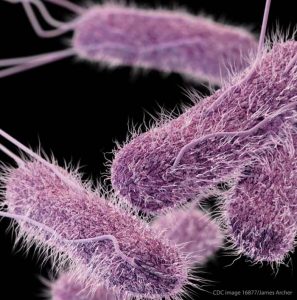A study published in PLOS Pathogens has discovered that Salmonella bacteria relies heavily on a single nutrient called frustose-asparagine (F-Asn) when it grows in the intestine. This nutrient is crucial to Salmonella growth in the inflamed intestine. When it doesn’t have access to this specific nutrient, the bacteria is significantly weakened.
 Since there are so many nutrients available to that bacterium in the intestine, doctors have thought that targeting those nutrients with drugs to stop the bacterial growth is next to impossible. But stopping access to a single nutrient is another story. Researchers found that a mutant of Salmonella that cannot get fructose-asparagine is “severely attenuated, suggesting that F-Asn is the primary nutrient utilized by Salmonella during inflammation,” according to the researchers. No other organisms utilizes this compound.
Since there are so many nutrients available to that bacterium in the intestine, doctors have thought that targeting those nutrients with drugs to stop the bacterial growth is next to impossible. But stopping access to a single nutrient is another story. Researchers found that a mutant of Salmonella that cannot get fructose-asparagine is “severely attenuated, suggesting that F-Asn is the primary nutrient utilized by Salmonella during inflammation,” according to the researchers. No other organisms utilizes this compound.
Researchers believe that if there was some way to block that nutrient, Salmonella infections could be stopped. The “fitness” of the bacteria dropped between 100- and 10,000-fold if it couldn’t access fructose-asparagine, even if other nutrients were available. The system for utilizing this specific nutrient was discovered during a genetic screen.
The genes needed to acquire that specific nutrient could be targeted using drugs. More importantly, the drug would only affect Salmonella. That means that other beneficial bacteria in the gut would not be affected by this treatment.
Researchers are now focusing on the time period when the bacteria access fructose-asparagine. They are also looking at species-specificity of the utilization system, in addition to the mechanisms by which F-Asn metabolism are regulated.





That’s great! I wonder how long it will take to finish the testing and manufacture a drug to treat this. Thanks for reporting on this